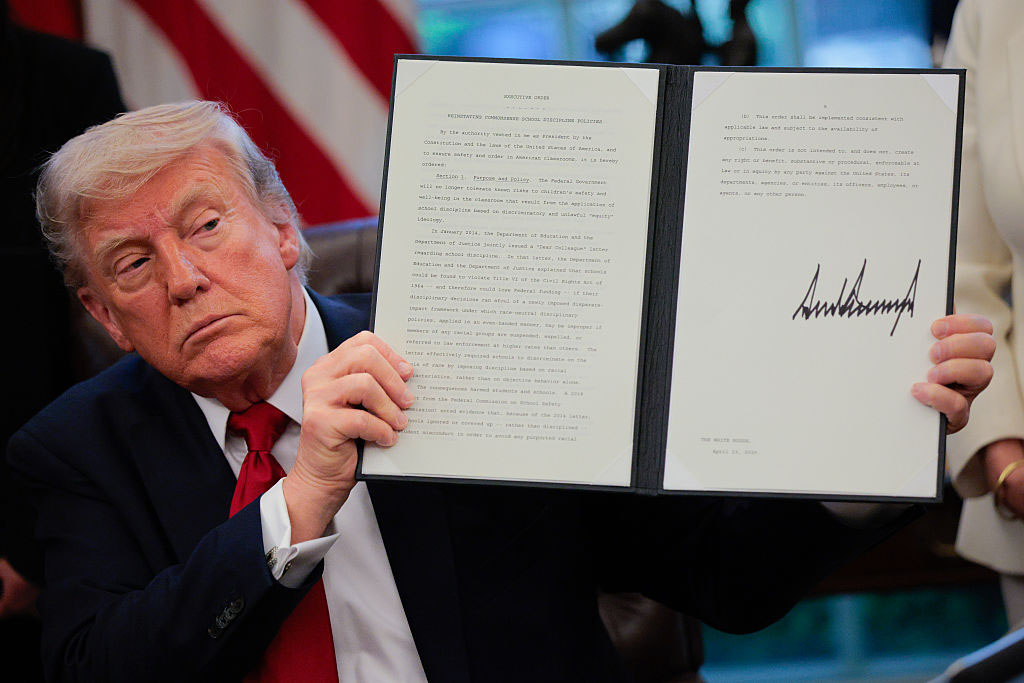Donald Trump does not easily call to mind thoughts of honeymoons—even though he has owned several honeymoon destinations. In closing out the first 100 days of his second presidency, it is difficult to say that his honeymoon in the White House is over. So divisive is his presence in American politics, neither the press nor the coastal elites bothered to grant him a honeymoon to begin with.
As he approaches this milestone, his polling numbers are sinking at the very moment when his many policy reforms are being challenged in federal courts. Faced with stalemates and legal injunctions—and until the Supreme Court breaks the logjam—will we ever know whether any of his many Executive Orders had a chance at succeeding?
The Washington Post, ABC News and Ipsos just released a poll showing Trump’s approval rating at 39 percent—down six percentage points from February. CNN marks his approval rating at 41 percent—a seven-point drop since February. Not since the first 100 days of the Eisenhower administration have approval numbers been this anemic at this early stage of a presidency, says CNN.
The economy seems to be the culprit. The Washington Post poll has 61 percent of respondents disapproving of the bungee-jumping stock market, global tariff maneuvers reminiscent of Wild West shootouts, and jittery recessionary fears.
The New York Times and Siena College Research Institute report that 54 percent worry about the economy, immigration and foreign trade—in that order.
Trump probably couldn’t care less about the polls. After all, the Russian collusion hoax, two impeachments, all those civil cases and criminal prosecutions, and two assassination attempts didn’t succeed in derailing or even flustering him. What is a New York Times poll but a political mosquito bite.
These are just the first 100 days. He still has 1,360 left to go. He ran for the presidency distancing himself from all the traps and trappings of a career politician. Chuck Schumer and Adam Schiff consume polls with their bran in the morning. Trump relies on a different laxative.
Meanwhile, a large segment of the American population believes that Trump is a power-hungry, authoritarian despot running roughshod over the federal bureaucracy. He’s slashing the budget, eliminating jobs, picking tariff fights with trading partners, stripping Ivy League universities of governmental grants, threatening law firms, and spreading fears over White House retribution. There is even speculation that he plans to run for a third term.
National Public Radio (NPR) reported that scholars have evaluated the health of America’s democracy, identifying 30 factors that spell dictatorial doom. These are: governmental infringement on freedom of the press, the punishing of political enemies, and the absence of judicial and congressional checks on executive power.
Trump, apparently, didn’t score well. The verdict: we’re not quite China, but we look a lot like Hungary and Turkey.
Authoritarian systems are devoid of checks and balances. Institutions—such as media, universities, nongovernmental organizations like the American Civil Liberties Union—are attacked as unpatriotic. Loyalists, let’s say an Elon Musk, suddenly wield enormous power without the constitutional authority to do so.
The Federal Communications Commission (FCC) is investigating CBS for its election coverage. NPR and Public Broadcasting Service are in the crosshairs of the FCC’s regulations on corporate underwriting. Local broadcast licenses might get revoked.
Yet, many of Trump’s initiatives are on pause precisely because federal courts are acting as a check on possible presidential overreach. But do these executive actions even qualify as an autocratic?
Tariffs might be rocking the American financial cradle, but they are intended to reclaim manufacturing jobs that were surrendered to China. Several state attorneys general are challenging Trump, but tariffs may fall within his foreign policy and national security authority.
Harvard, Princeton and Columbia have been threatened with the withholding of federal funding and being stripped of their tax-exempt status. All of it is traceable to the on-campus antisemitic upheavals following the October 7 massacre in Israel. Jewish faculty and students were under threat and faced discrimination. In response, Trump is rescinding student visas belonging to those who led pro-Hamas protests. He is also looking to put an end to the foreign student pipeline altogether.
Despite the Supreme Court’s recent ruling invalidating affirmative action, Ivy League schools, in particular, addicted to DEI and allergic to ideological diversity, have circumvented the law.
Illegal immigrants, many with criminal records and gang affiliations, are being deported. It is estimated that as many as 11 million unvetted migrants are in the United States illegally, the vast of majority of whom are fancy-free with no direction home. Last April, 4,000 entered the United States illegally. This April, just three people have done so.
If this statistic is wholly meaningless to you, then either seeing the fall of America is one of your pet priorities, or your hatred of Donald Trump overrides all other considerations.
Israel is finally able to rid Gaza of Hamas and reclaim the remaining hostages without an American president and secretary of state trampling upon its sovereign rights. Jewish students may soon be able to attend class without masked and clandestine Islamists and pink-haired antisemitic sorority sisters blocking their way.
As for DEI, it takes an especially maladroit mind to not realize that such stratagems are a one-way ticket to mediocrity. If you graduated from a medical school where DEI redefined the teaching of anatomy, then, nothing personal, but I don’t want you touching me. Engineers educated at schools where such phrases as “implicit bias,” “the myth of meritocracy,” and “white supremacy culture” were used, should have the decency to alert us which bridges they built so we can avoid crossing over them.
If you graduated from a medical school where DEI redefined the teaching of anatomy, then, nothing personal, but I don’t want you touching me.
The political strongmen to whom Trump is being compared, Venezuela’s Hugo Chávez and El Salvador’s Nayib Bukele, are populists who enjoy 90 percent approval ratings and win landslide elections. They even re-wrote their country’s constitutions, granting themselves maximum power.
Is that where Trump’s critics believe we are headed?
Maybe, just maybe, some of what Trump is doing is in America’s best long-term interest. They’re not examples of presidential overreach. Instead, they fall squarely under the powers granted to him under Article II of the Constitution.
Maybe, just maybe, some of what Trump is doing is in America’s best long-term interest. They’re not examples of presidential overreach. Instead, they fall squarely under the powers granted to him under Article II of the Constitution.
Alexander Hamilton, who improbably became the protagonist of a Broadway musical, imagined the American president as an energetic executive who is deferred to in matters of foreign policy and national security.
“Energetic” is the last thing that could be said about the Biden presidency. If anything, it suffered from a serious bout of under-reach.
Perhaps the Supreme Court will soon determine which vision of the presidency should prevail.
Thane Rosenbaum is a novelist, essayist, law professor and Distinguished University Professor at Touro University, where he directs the Forum on Life, Culture & Society. He is the legal analyst for CBS News Radio. His most recent book is titled “Saving Free Speech … From Itself,” and his forthcoming book is titled, “Beyond Proportionality: Israel’s Just War in Gaza.”




